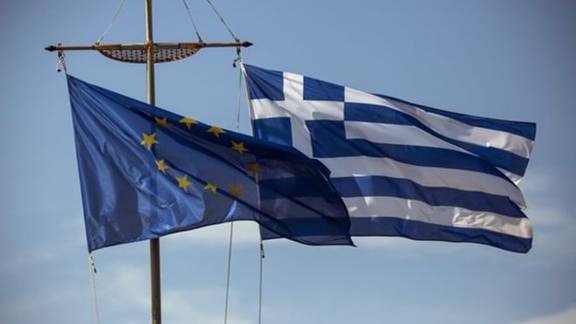A debt crisis in Greece appears to have been averted, at least for the time being. German chancellor, Angela Merkel, emerged from meetings today sounding more positive about a deal that would keep Greece from defaulting on loan payments that are about to come due. The two sides promised to reconvene later in the week to discuss a new proposal put forward by the Greek government.
NPR's Jim Zarroli joins us now. Hey there, Jim.
JIM ZARROLI, BYLINE: Hi, Audie.
CORNISH: So today's summit was billed as a last-ditch effort to keep Greece from defaulting, and yet here we are talking about more time. What actually ended up happening?
ZARROLI: Well, what ended up happening is what has happened so often during this crisis. The two sides kind of, you know, came to the brink and pulled back. There's been a history of procrastination between the two sides as they try to work out Greece's debt problems. The Greek government has been intransigent over the past few months. It's refused to agree to the pension cuts and the tax increases that European officials want. But then early today, Greek officials came up with a new set of proposals. And this new set of proposals would reportedly require employers to increase their pension contributions. European officials were fairly positive about it. Here was the man who is leading the bailout talks, the Dutch Finance Minister, Jeroen Dijsselbloem.
(SOUNDBITE OF ARCHIVED RECORDING)
JEROEN DIJSSELBLOEM: It's a welcome step and we consider it a step in a positive direction. So I think it is also an opportunity to get that deal this week, and that's what we'll all work for.

ZARROLI: And then there were more meetings later in the day. Nothing was, you know, definitively decided, but the day of reckoning has been put off a bit longer. There's a lot more optimism. There's another Eurozone meeting later this week, and that'll be another chance to try to fix things.
CORNISH: For those of us confused about all these deadlines, how much time does Greece actually have left before it's officially in default?
ZARROLI: Well, Greece is supposed to pay the International Monetary Fund $1.8 billion by the end of this month. Then it owes more money in July and August. Now, it doesn't really — it doesn't have the funds to pay what it owes. It can't borrow any money in the financial markets without paying high interest rates. Europe has agreed to give Greece bailout money in installments, but it has refused to hand out the latest installment until Greece agrees to these budget concessions. Now, this stalemate, as I said, has been dragging on for a while, but it has gotten a lot nastier since the election of the new Greek prime minister, Alexis Tsipras, recently. He came to office promising absolutely to oppose any more austerity measures which have caused the Greek people a lot of pain. And he really can't backtrack very much right now on that promise, or he's going to pay a political price at home.
CORNISH: In the meantime, Jim, what happens if Greece can't manage to work out a deal this week? What are the consequences?
ZARROLI: Well, I will say it. The odds are now — it looks like Greece and Europe will manage to muddle through once again. They have, as I said, done this many times. And the financial markets are certainly betting that they will. Interest rates were down again today — Greek interest rates. After this new proposal came out, stocks were up, including in the United States. If they can't fix this, if they can't muddle through again, then Greece will be in arrears to the IMF.
But the real problem is what's going to happen on the ground. People have been pulling their money out of Greek banks. They're worried that the government might have to impose some kind of capital controls. It could even shut down the banks. People wouldn't have access to their money. If that happens, the economy would really grind to a halt. And as bad as things have been in Greece over the past few years, this would be a lot worse. Businesses couldn't operate. You know, there could be a run on the banks. Now, that hasn't happened, and people seem more optimistic that it won't. But everyone right now is under pressure to come up with a deal, and that absolutely includes the Greek government.
CORNISH: That's NPR's Jim Zarroli joining us from New York talking about today's meeting to keep Greece from default. Jim, thanks so much.
ZARROLI: You're welcome.













